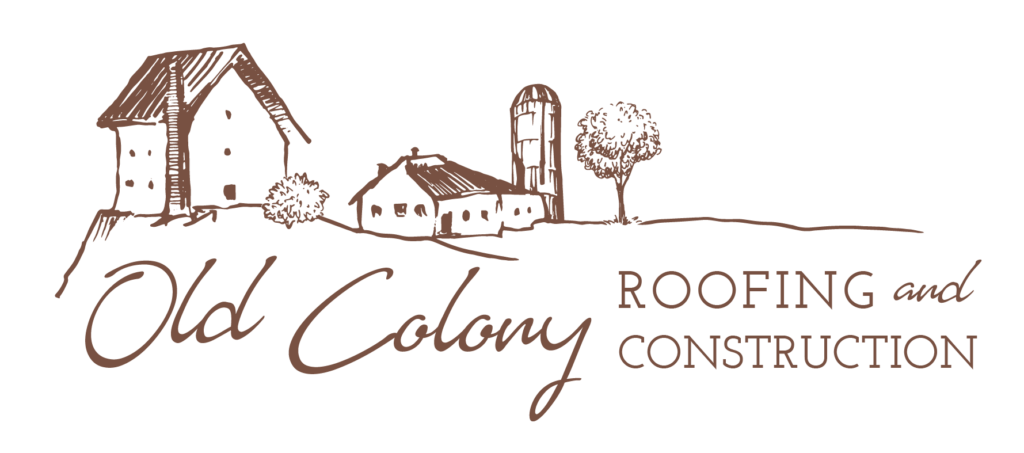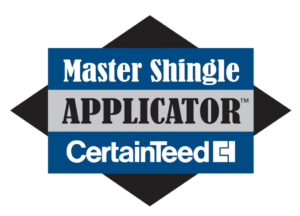Chimneys
Chimney Waterproofing
The bricks that make up your chimney will leak with time. Chimney waterproofing is one of the best home investments you can make. Having an expert roofer/chimney sweep clean the exterior of the chimney and apply a 100% vapor – permeable, water repellent clear membrane will keep water out and keep your brick-and-mortar chimney looking great and standing strong for many years to come.
Chimney Cap Installation
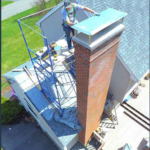 Quality chimney caps play a vital role in keeping chimneys leak-free. If your cap has rusted, blown off, or is otherwise missing, water (not to mention animals, birds, and debris) has 24/7 access to your chimney flue. Installing a new chimney cap will provide you with decades of protection. Chimney caps come in a variety of materials and styles. Stainless-Steel are most common, but copper is an option as well.
Quality chimney caps play a vital role in keeping chimneys leak-free. If your cap has rusted, blown off, or is otherwise missing, water (not to mention animals, birds, and debris) has 24/7 access to your chimney flue. Installing a new chimney cap will provide you with decades of protection. Chimney caps come in a variety of materials and styles. Stainless-Steel are most common, but copper is an option as well.
Chase Cover Installation
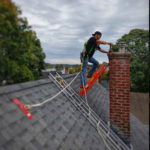 Wooden or vinyl-sided chimney chases need protection against water too, and the chase cover is designed to provide it. Unfortunately, stock chase covers installed by builders are commonly made of low-quality galvanized steel, which doesn’t take long to rust and corrode. Get the long-lasting protection your chimney deserves and keep rust stains and leaks from occurring by having your chase cover replaced with a durable and rust-resistant stainless steel chase cover.
Wooden or vinyl-sided chimney chases need protection against water too, and the chase cover is designed to provide it. Unfortunately, stock chase covers installed by builders are commonly made of low-quality galvanized steel, which doesn’t take long to rust and corrode. Get the long-lasting protection your chimney deserves and keep rust stains and leaks from occurring by having your chase cover replaced with a durable and rust-resistant stainless steel chase cover.
Crown Repair & Rebuild
Like the chase cover, the crown of a masonry chimney is designed to close off the top of the chimney and keep water out of the system. But crowns aren’t always built to last, and sometimes, even if they are, they crack and allow water in. Crowns are traditionally cement, however, there are occasions where metal are used. Either way, replacing a crown should be finished with a waterproofing at completion.
Chimney Flashing
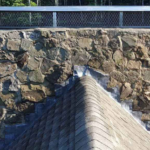 Because chimneys are a penetration through your roof or against the roof, flashing is critical. Now, during a roof replacement this should always be done, but there are many occasions when the roof still has life left in it but the flashing around the chimney has begun to allow water to penetrate. In those cases, the removal of the surrounding shingles and the old base and counter-base flashings are removed and replaced. Then new shingles are matched and installed. The most common materials for chimney flashings are lead, metal, and copper. Your professional can work with you to determine which is the right type for your chimney.
Because chimneys are a penetration through your roof or against the roof, flashing is critical. Now, during a roof replacement this should always be done, but there are many occasions when the roof still has life left in it but the flashing around the chimney has begun to allow water to penetrate. In those cases, the removal of the surrounding shingles and the old base and counter-base flashings are removed and replaced. Then new shingles are matched and installed. The most common materials for chimney flashings are lead, metal, and copper. Your professional can work with you to determine which is the right type for your chimney.
Masonry Damage
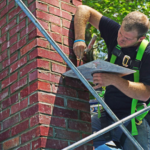 If you’ve noticed signs of deterioration and discoloration on the bricks that make up the chimney, this could signal water damage or structural issues and may require masonry repair and chimney rebuilds. These repairs include having a portion of the chimney rebuilt or lengthened, masonry joints repointed or tuckpointed, or the entire chimney taken down and rebuilt. A reputable company will provide a warranty for these services.
If you’ve noticed signs of deterioration and discoloration on the bricks that make up the chimney, this could signal water damage or structural issues and may require masonry repair and chimney rebuilds. These repairs include having a portion of the chimney rebuilt or lengthened, masonry joints repointed or tuckpointed, or the entire chimney taken down and rebuilt. A reputable company will provide a warranty for these services.
We Know Roofs
Whether, you are looking at repairing an existing roof, or replacing a roof, there are plenty of questions to answer. Old Colony Roofing is here to provide credible and honest information – from a true expert.
The goal of these pages is to arm you with the pros and cons of a variety of roofing questions and answers.
Ask About Our Financing
Roofs as low as $99/month*
Roofing Repairs
The good news is, roofs can be repaired. The bad news is, there are reasons why this may not make sense. First, it is important to discuss common roofing failures and why these result in leaking. See below for a list of common roofing failures:

